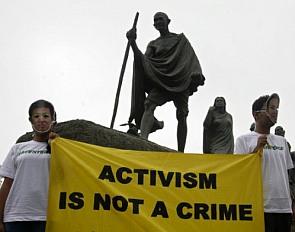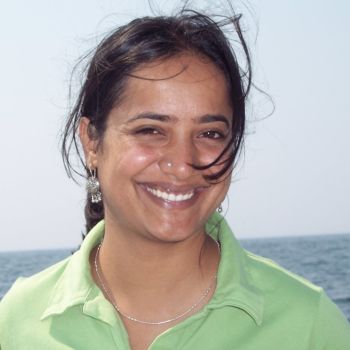 | « Back to article | Print this article |
 'We are facing a crackdown for more than a year. Our permission to collect funds was cancelled. Our bank accounts were frozen.'
'We are facing a crackdown for more than a year. Our permission to collect funds was cancelled. Our bank accounts were frozen.'
'We believe that our work in India is very important. We want to be the environment watchdog. We do not want to waste time fighting legal battles.'
Greenpeace has been in the news for all the wrong reasons recently. The NGO that campaigns for a clean and safe environment around the world has had it registration cancelled in India. Earlier, its bank accounts were frozen and one of its members was stopped from traveling abroad.
Greenpeace India's Interim Executive Director Vinuta Gopal, below, left, spoke to A Ganesh Nadar/Rediff.com about the problems it confronts and its future plans.
Though the Tamil Nadu Registrar of Societies has cancelled your registration, you blame the ministry of home affairs. Why?
We are facing a crackdown for more than a year. Our permission to collect funds under the Foreign Contribution (Regulation) Act was cancelled. Our bank accounts were frozen. One of our members Priya Pillai was stopped from traveling abroad. This started with an Intelligence Bureau report in June last year.
The government says you have continued to use your Foreign Contributions Registration accounts even after they were suspended. Is this true?
It is not true. We are relying on Indian donations. The courts have given us permission to use Indian contributions. We have more than 70,000 Indian citizens who are our contributors. We are using that money. We have separate bank accounts for local contributions.
Is it true that the government objected to the composition of your board of directors? What was the objection?
This is not true. We have not received any communication from the government on our board of directors. All our directors are eminent citizens of India. In India we are registered as a trust and a society.
The initial accusation against you was that you were sponsoring 'anti-development' campaigns across the country.
Please ask them. Our campaigns are on climate change, on coal mines in central India. In Madhya Pradesh we saved the Mahan forest from being destroyed.
This was a coal block for Essar. The environment ministry agreed with us that the forest should be protected.
We don't know why the government is calling us anti-national.
What about the funds that you receive from local contributors? Are you still using that?
We are surviving on local donations. We get Rs 250 to Rs 500 per month from individual contributors. Bengaluru and Pune are the cities from where most of our financial support comes from.
What are the legal options that you are pursuing?
We are challenging the cancellation of our registration in the Madras high court. Earlier, we had approached the court when they issued a show cause notice against us asking why we shouldn't be shut down.
We had responded to the notice. On our plea the high court had said that the registrar should respond to the points we had raised. They have ignored the court order.
Apart from legal options, what other course of action are you planning?
We have always got relief from the courts. We have also petitioned United Nations Secretary General Ban Ki-moon to raise the issue with the Government of India. We believe that we will finally get relief from the court.
What about the future of your employees?
Our employees have realised that it is a campaign against Greenpeace. 'Clean air, safe food and sustainable energy' -- all of these are needed. The Constitution gives us a right to all the above. Even now they (Greenpeace employees) are ready to work for these aims.
 We have been working in India since 2001. A French warship had come here with asbestos to dump it as waste. We campaigned and sent it back. We campaigned for the suppliers liability clause in the Nuclear Liability Act.
We have been working in India since 2001. A French warship had come here with asbestos to dump it as waste. We campaigned and sent it back. We campaigned for the suppliers liability clause in the Nuclear Liability Act.
We saved the Mahan forest and the people who live there.
In Bihar we brought light to Dharnai village which had no electricity. We set up a micro-grid there with solar energy.
In agriculture we have campaigned against genetically modified seeds.
In our Clean Tea campaign we had told them not to use too many pesticides and the industry agreed.
What are your future plans for the organisation?
We believe that our work in India is very important. We want to be the environment watchdog. We do not want to waste time fighting legal battles.
We will focus on our campaign for clean air, safe food, sustainable energy and forest protection.